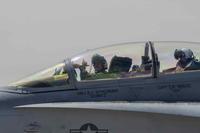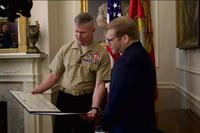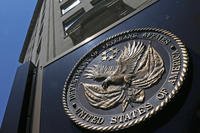America's national security interests lie fundamentally in Pakistan, not in Afghanistan, and the United States needs a strategy beyond throwing money at the Pakistanis, according to Fred Kagan, one of the architects of the counter-insurgency efforts in Iraq.
"You don't reasonably have anything you can call a strategy," said Kagan, who spoke at a breakfast organized by the National Defense University. He acknowledged that Pakistan "is very hard to do," but stressed that the stakes far exceed those at risk in Afghanistan. Pakistan's population is orders of magnitude greater than Afghanistan's. It is neighbor to one of America's most important allies, India. And, perhaps most troubling, the Pakistanis believe that America's need to resupply its troops in Afghanistan mean "they us over a barrel." Combine that with the view of many Pakistani intelligence and military officials that America is a "Trojan horse" allowing for greater Indian influence in the region and US policymakers face a daunting challenge.
Kagan admitted he has not come up with an effective strategy for Pakistan, as he has appeared to do for Iraq with the help of a small circle of counter-insurgency experts. He did outline some basic steps that should be accomplished to demonstrate we are succeeding. Succeeding in Afghanistan would greatly lessen the hold Pakistan does have on us in return for allowing US supplies to transit their country. "The faster we can succeed in Afghanistan the faster we can put pressure on Pakistan," Kagan said.
An additional problem the US faces is that “substantial” parts of the Pakistani military and intelligence services are complicit with the Taliban and other extremist groups conducting attacks in Pakistan, Afghanistan and India. , as one of Kagan's confederates in the COIN world, Petraeus adviser and former Australian army officer, David Kilcullen, told the House Armed Services Committee. Kilcullen urged Congress to attach stringent conditions on aid to Pakistan, funnel any money for the military through the civilian authorities and shift funding from the military to the Pakistani police, a potentially more effective force to combat extremists. Kagan also said that throwing money at Pakistan would not be effective.
The US should "insist" when provide aid to the Pakistani military or national police that they accept trainers from us and aid should be accompanied by US aid workers in Pakistan.
The US has already poured $10 billion in U.S. assistance into Pakistan since 2001.
What has the U.S. gotten in return for that $10 billion investment? Kilcullen provides a pretty grim list - some highlights:
• The takeover of large parts of northeastern Pakistan by the Pakistani Taliban facilitated by a series of peace agreements signed directly between militants and the military.
• The July 2008 Indian embassy bombing in Kabul, which Afghan intelligence concluded was supported by Pakistan’s powerful intelligence services, ISI.
• The Mumbai terror attack in November 2008 carried out by members of Lashkar e-Tayyiba, a militant group sponsored and trained by the Pakistani military and ISI.
• The closing of U.S. and NATO supply lines through Pakistan at least 6 times in 2008 along a route supposedly protected by the Pakistan military.
• Numerous incidents of the Pakistani military and Frontier Corps allegedly firing on U.S. troops inside Afghanistan, preventing them from cashing Taliban escaping back to sanctuaries in Pakistan.
• Several reported incidents of Taliban setting up mortar and rocket firing positions in clear view of Pakistani military bases near the frontier with no interference from the military.
• The creation of militant safe houses and operational cells in major Pakistani cities such as Peshawar, Quetta, Karachi, Lahore and Islamabad.
The list goes on. Kilcullen says little attention and funding has been given the Pakistani Frontier Constabulary and the regular police, both of which are critical to a counterinsurgency. “Pakistan needs a much larger, much better equipped, better trained, better supported and better paid police force. The fact that it doesn’t have one is partly because the police are a major institutional rival to the army and we have funneled the vast majority of our aid to, and through, the military.” Further, the Pakistani police do not have the “institutional tradition” of supporting extremist groups that afflicts the military.
Kilcullen’s bottom line: “Increasing assistance to the police – making the police, in effect, the premier counterinsurgency force – while channeling all military support through civilian authorities and ensuring greater accountability and conditionality on military assistance, is the correct approach.”
Greg Grant contributed mightily to the story, writing the material about Kilcullen.








